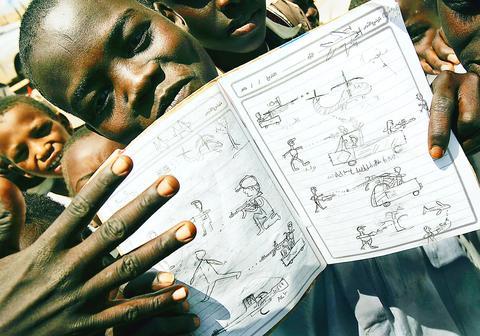Sudan's government is likely to grant some autonomy to the violence-wracked Darfur region, but the rebels should help to end the world's worst humanitarian crisis, UN High Commissioner for Refu-gees Ruud Lubbers said.
Lubbers, who called for Khartoum to grant more autonomy to the region at the start of his current tour of Chad and Sudan, said Khartoum risked alienating the world if it continued its attacks in Darfur, one of the nation's most politically and economically powerless areas.

PHOTO: AP
"Sudan is under very great pressure," he said, adding that despite a "strange political atmosphere" the country was increasingly buckling under world opinion.
"The international community is watching Darfur with tremendous interest. It's not only Washington [which has called the violence in Darfur genocide] but also the Security Council and [Nigerian] President Obasanjo of the African Union.
"Sudan knows that, and I think will give Darfur limited autonomy under the framework of Khar-toum's territorial integrity."
The UN has called Darfur the world's worst current humanitarian crisis, and Germany has joined the US in describing the brutal campaign waged by Arab militias in Darfur as genocidal.
An estimated 50,000 people have been killed and 1.4 million have fled their homes, including 190,000 who have sought refuge in neighboring Chad.
The UN Security Council has passed a resolution which warns of possible sanctions, which Khartoum has termed "unjust and unfair" but promised to abide by.
The sanctions could affect Sudan's vital oil industry.
The bloodshed in Darfur began in February last year, when rebels demanded an end to the official neglect of violence and poverty in their region. The Sudanese government's response to the uprising was to give Arab militias known as Janjaweed a free rein to raid and pillage. The Janjaweed have been accused of widespread murder, rape and torture.
But Lubbers said the two rebel groups fighting in Darfur had a responsibility to end the violence by burying their differences.
"The government has an uphill task, because it has created the Janjaweed which is practicing violence ... but my message to the rebels is `You have achieved enough to sit down at the negotiating table, though you will be more successful if you agree on a first man [leader] to represent you. It is in your interest to start now.' Darfur has bled enough."
Lubbers also urged South African President Thabo Mbeki to join Nigerian President Olusegun Obasanjo's efforts to end the violence in Darfur.
"Mbeki did many good things," he said. "He is a great leader, but if he gives his political weight to support President Obasanjo it would be a great thing. The world is looking to Africa to resolve its problems and President Mbeki's voice is very important."
The UN refugee chief expressed fears over rising local resentment in Chad, one of the world's poorest and most arid nations, that the refugees were using too much of their meager water and firewood resources.
"It's now more irritating than explosive, but we have to prevent it from growing into an explosion," he said, adding that many Chadians complain that the refugees are better off than themselves.

A feud has broken out between the top leaders of the far-right Alternative for Germany (AfD) party on whether to maintain close ties with Russia. The AfD leader Alice Weidel this week slammed planned visits to Russia by some party lawmakers, while coleader Tino Chrupalla voiced a defense of Russian President Vladimir Putin. The unusual split comes at a time when mainstream politicians have accused the anti-immigration AfD of acting as stooges for the Kremlin and even spying for Russia. The row has also erupted in a year in which the AfD is flying high, often polling above the record 20 percent it

Ecuadorans are today to vote on whether to allow the return of foreign military bases and the drafting of a new constitution that could give the country’s president more power. Voters are to decide on the presence of foreign military bases, which have been banned on Ecuadoran soil since 2008. A “yes” vote would likely bring the return of the US military to the Manta air base on the Pacific coast — once a hub for US anti-drug operations. Other questions concern ending public funding for political parties, reducing the number of lawmakers and creating an elected body that would

The latest batch from convicted sex offender Jeffrey Epstein’s e-mails illustrates the extraordinary scope of his contacts with powerful people, ranging from a top Trump adviser to Britain’s ex-prince Andrew. The US House of Representatives is expected to vote this week on trying to force release of evidence gathered on Epstein by law enforcement over the years — including the identities of the men suspected of participating in his alleged sex trafficking ring. However, a slew of e-mails released this week have already opened new windows to the extent of Epstein’s network. These include multiple references to US President Donald

CHARGES: The former president, who maintains his innocence, was sentenced to 27 years and three months in prison for a failed coup bid, as well as an assassination plot Far-right former Brazilian president Jair Bolsonaro is running out of options to avoid prison, after judges on Friday rejected his appeal against a 27-year sentence for a botched coup bid. Bolsonaro lost the 2022 elections and was convicted in September for his efforts to prevent Brazlian President Luiz Inacio Lula da Silva from taking power after the polls. Prosecutors said the scheme — which included plans to assassinate Lula and a top Brazilian Supreme Court judge — failed only due to a lack of support from military top brass. A panel of Supreme Court judges weighing Bolsonaro’s appeal all voted to uphold